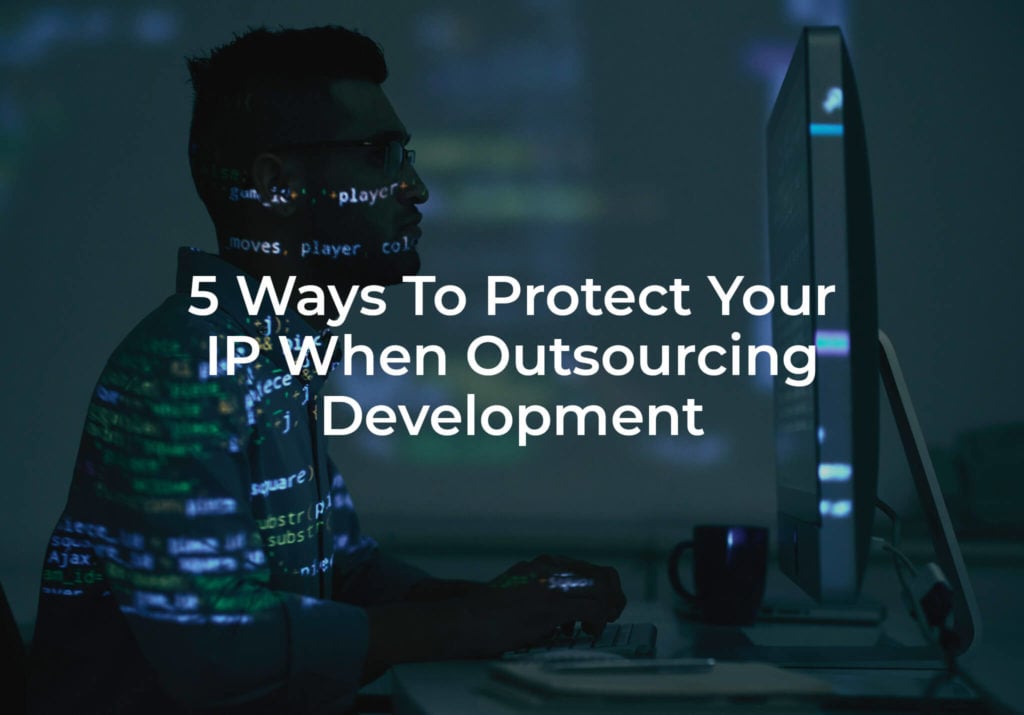Starting a SaaS company is a difficult endeavor. You need to assemble a great team, build the right product, acquire customers, and scale the business. But one thing that often gets overlooked by startup founders is how to protect their Intellectual Property (IP) when outsourcing development.
Outsourcing software development is a common practice for startups that want to grow without taking on the cost of hiring full-time employees, but can be a risky undertaking as it often involves handing over your company’s confidential information to potential competitors.
For startup founders, IP protection should be a critical component of their company’s model—especially if their software has unique features that differentiates the product in the marketplace.
In this article, we share 5 key strategies that you can implement to protect your intellectual property and competitive advantage when outsourcing development.
#1 Draft a Comprehensive Work for Hire Agreement
One of the best ways to mitigate the risk of IP theft is by carefully crafting contracts from day one. Even if you are hiring a developer on a per project basis, a carefully-constructed contract can help you avoid potential conflicts and IP breaches.
It’s important to make sure the contract is enforceable in every country involved. If you are outsourcing internationally, the best way to go about this is to hire an attorney from your developer’s home country to review the contract. In many cases, your US counsel can refer you to an attorney that can assist with this.
The most important thing to remember when outsourcing software development is ownership of the final product. It should be clearly stated in your contract that you own whatever work has been done during the project, including source code and all intellectual property.
Here are some IP-related clauses that you should strongly consider including in the contract:
- Full rights of ownership for IP created by the developer for your company.
- Requirements for sensitive data and IP management.
- A confidentiality provision encompassing IP, trade secrets, work processes, and components of the software.
- In the “Governing Law” section, state your jurisdiction as the applicable governing law of the agreement. This way any violation to this contract will fall under its regulations and be resolved in your jurisdiction if a dispute arises.
- In order to ensure a smooth business relationship, the contract should state what is expected in terms of payment, deliverables and timelines.
It’s a good idea to keep IP protection as one of your top priorities when it comes to outsourcing software development. You should also specify that as the owner of all IP created during the project, you can use, assign, or modify work product however you want.
#2 Non-Disclosure Agreement (NDA)
When outsourcing work to domestic or international talent, a non-disclosure agreement (NDA) can provide important protections and a basis for enforcing your rights. NDAs prevent the signee from disclosing certain information, including software development and technical data, to third parties. But the agreement can also encompass far more.
Your NDA must be worded broadly enough to cover anything under the scope of that outsourced developers work yet specific enough so they know what cannot be shared or kept by them. An NDA is a great way to protect intellectual property, as it can be enforced even after the project has been completed.
When the time comes to end your contractor’s agreement, it is a best practice to reinforce what is covered by the NDA. An IP owner should conduct an exit interview and reiterate exactly what the contractor is obligated not to do—such as sharing confidential information—before parting ways.
#3 Thoroughly Document Everything
The first step would be to identify the IP you own, how it’s protected, and which IP needs to be disclosed for outsourcing purposes. You should not disclose your intellectual property unless absolutely necessary, even if an executed NDA is in place.
In addition, you should document all communications, tasks completed, source code created, and project notes. These notes may be useful if a dispute ever arises and may also be a good reference point when planning future implementation strategies.
Choosing a developer is an important decision. Finding the right partner can be time consuming, but it’s worth your while to make sure you’re choosing the best one for you and your business goals. Accordingly, always ask upfront about their development and data protection processes before deciding on which developer to outsource work to.
#4 Limit Server & Data Access
When outsourcing work to a developer, it’s a good practice to limit server, API, and data access to only what’s necessary for the developer to complete the requested tasks. It is best to avoid sharing the company’s IP. Typically, startups will keep the more classified portion in-house, and then have your internal team merge the outsourced developers contribution thereto upon completion and thorough review.
#5 Thoroughly Vet Before Outsourcing
Before engaging with an outsourcing development, conduct due diligence on any potential developers, especially if they are located abroad. Here are some steps you can take to vet developers before hiring:
- Ask if they subcontract any of their development work. If so, you will need to ensure they are taking the proper measures to protect your IP and confidential information.
- Find out where they are located because laws can vary by country and you will need to adapt your contract accordingly.
- Use platforms like UpWork and Freelancer, Topal, etc., which show verified reviews and feedback from past clients the developer has worked with.
Vetting prospective partners is an essential practice for avoiding IP losses and we urge you to develop an internal process that can be used anytime your company outsources work to a developer.
What Is Considered Intellectual Property?
The following are all considered intellectual property:
- Utility Patents – protects key software processes and functions.
- Design Patents – protects your Graphical User Interface (GUI).
- Trademarks – protects your brand, logo, business name, or slogan.
- Copyright – protects your source code, website, and sales materials.
- Trade Secrets – protects technical information, user data, internal processes, research data, etc.
Before you start outsourcing, decide what IP you are willing to disclose and what IP should be kept within the company. If any of the work relies on anything that belongs to a third party, always check your agreement with them prior to disclosing any sensitive information.
A company’s IP is often their most valuable asset. The risk of not protecting IP is even higher for small and startup companies where it can be the only tangible asset they have. By following the steps in this article and consulting with an experienced attorney, you can be well on your way to outsourcing developers like a seasoned founder.




